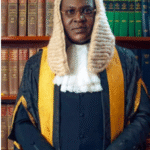The Socio-Economic Rights and Accountability Project (SERAP) has filed a lawsuit against Senate President Godswill Akpabio over the Senate’s failure to reverse the unlawful suspension of Senator Natasha Akpoti-Uduaghan. SERAP argues that her suspension is solely based on the peaceful exercise of her right to freedom of expression.
Mr. Akpabio is being sued personally and on behalf of all Senate members. The Senate recently suspended Senator Akpoti-Uduaghan for six months after she allegedly “spoke without permission” and “refused her new seat in the chamber.” During this period, her salary and allowances have been withheld, and she has been barred from identifying herself as a senator.
In suit number FHC/ABJ/CS/498/2025, filed last Friday at the Federal High Court in Abuja, SERAP is seeking:
- An order of mandamus compelling Mr. Akpabio to rescind the unlawful suspension, reinstate Senator Akpoti-Uduaghan, and restore all her legislative rights and privileges.
- A perpetual injunction preventing the Senate from suspending or taking disciplinary action against her solely for exercising her fundamental human rights.
- A declaration that sections 6(1)(2) of the Senate Rules, as amended in the 2023 Standing Orders, violate her human rights and deprive her constituents of their right to political participation.
SERAP argues that upholding this application would serve the public interest and reinforce respect for human rights in the National Assembly. The organization insists that no senator should be punished for “speaking without permission” and that being a senator does not strip individuals of their fundamental rights.
According to SERAP, Senator Akpoti-Uduaghan’s suspension is unlawful, unnecessary, and disproportionate. It creates a chilling effect on other senators’ ability to express themselves freely and undermines democratic principles. SERAP maintains that the grounds cited for her suspension appear to be a pretext to suppress her fundamental rights.
The lawsuit, filed by SERAP’s legal team, argues that any restrictions on freedom of expression must comply with constitutional and international human rights norms. It references:
- The Nigerian Constitution (Section 39), which guarantees freedom of expression.
- The African Charter on Human and Peoples’ Rights (Article 9 & 13), which affirms the right to receive and disseminate information and participate in governance.
- The International Covenant on Civil and Political Rights (Article 19), which mandates that freedom of expression should not be unduly restricted.
SERAP further asserts that political speech, particularly criticisms directed at government officials, requires a higher level of tolerance. The Senate, it argues, has an obligation to uphold the rule of law rather than suppress democratic engagement.
The lawsuit emphasizes that Senator Akpoti-Uduaghan’s suspension not only violates her rights but also undermines her constituents’ ability to participate in governance through their elected representative. SERAP urges the court to rule in favor of reinstating her and protecting the broader principles of democracy and free expression.
No date has been set for the hearing of the suit














Add Comment